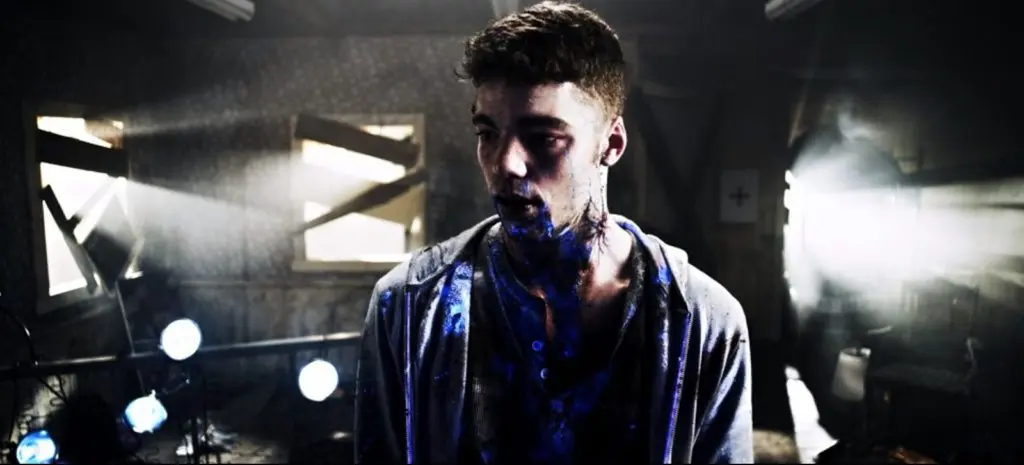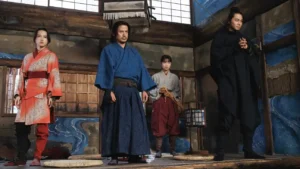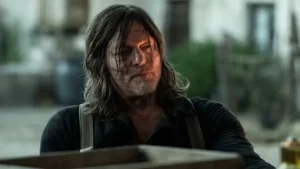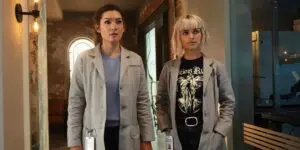Summary
With Brightburn coming soon, David Yarovesky’s other movie came to my attention. I just hope his new one has more spark.
The Hive does one special thing to the zombie formula. When Adam (Gabriel Basso) starts to remember his life, he says, “I must be an a**hole.” Detaching yourself from your experiences and judging them as an outsider is the core of any good amnesia story; it’s how director David Yarovesky takes a good look at his genre too. He doesn’t hope to change these people: he hopes to displace them from themselves. He’s rooting around inside Christopher Nolan’s Memento looking for the answers to his tension problem and he never quite finds it.
The problem is that he can’t get a handle on intrigue. He spends all of The Hive spinning a story about experimentation, cruelty, and the accident of a lot of stupidity, but he never envisions it as more than plot. Adam is constantly flashing into the memories of random strangers, vaguely coordinated by his desire to figure out what’s happened to him. He’s alone in a room with a dead girl, a full-body blemish, and no memory. He wants answers. But the script by Yarovesky and Will Honley makes no attempt at suspense beyond acquiring these answers and as a result, it never gets better than that for us either. The “mystery” is just that the script doesn’t immediately explain the plot. But that doesn’t mean that it’s intriguing.
Russian scientists experiment on the human capacity for telepathy and their failed experiment gets out. If this sounds like it might be less than 90 minutes worth of prolonged explanation, it’s because it is. When Adam takes a card out of his pocket that has Russian words on it and the hazmat danger sign, any human being who’s seen at least one B-movie would get the gist. But extenuating the gist is all Honley/Yarovesky can think to do: they really think we need this movie explained to us.
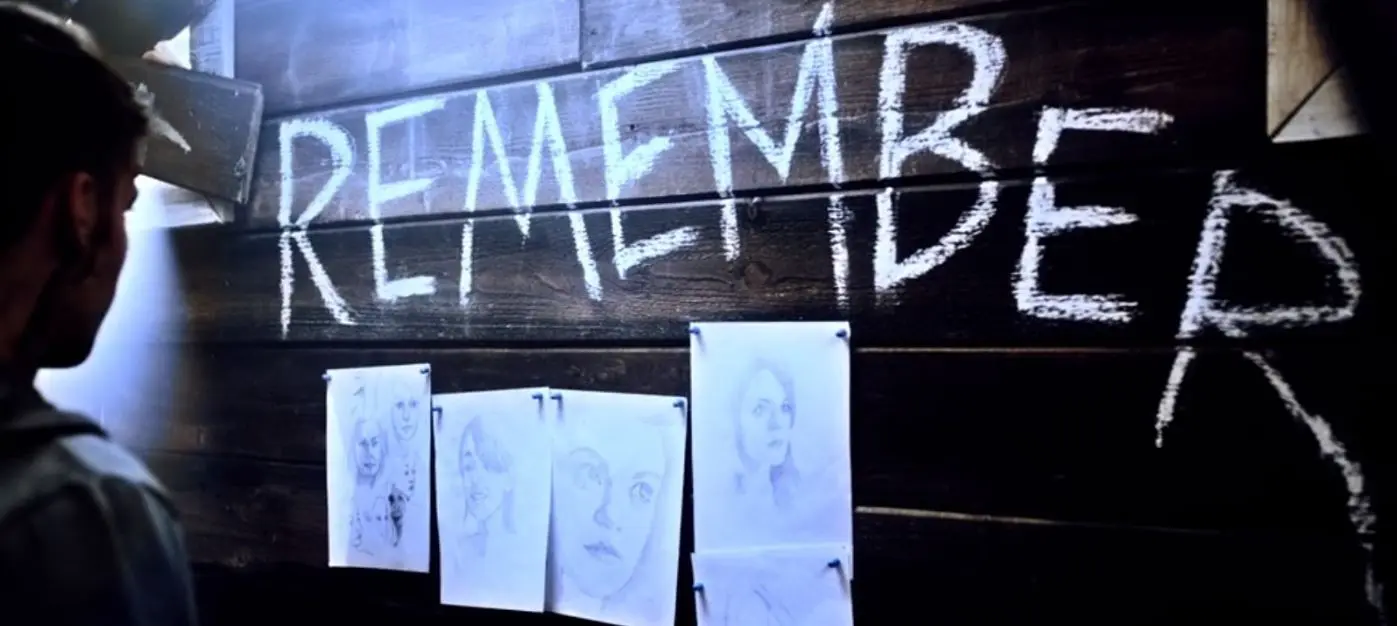
We realize at some point that The Hive is coming back around to Memento when the messages written in chalk on the wall start to inform Adam’s understanding of the problem. But characters in this movie say things like, “I’ll leave myself a little note” after discovering something and right before we see them do it, as though we can’t see this happening for ourselves. It’s so hacky that I don’t even know how they come to these revelations sometimes; the script just knows that it’s time for them to learn something, no matter how abrupt it is. For instance, someone awakens from their zombie state, when they’re connected to the Hive – the telepathically linked diseased people – and Adam says, “If you remember something important, you snap out of it!” He says it like there’s no other possible explanation. Despite being distastefully dumb throughout the movie, there are times when these people seem to have a copy of the script to study because we just need to keep moving.
That’s not to say that the actors don’t give it the ol’ community college try. Adam and Katie’s (Kathryn Prescott) scene together is aggressively youthful but it gets the point across. At least The Hive knows that their past relationship is the key to Adam’s anxiety in the present day and spends some time on it. He even tells us about a time when he was a boy and got lost in the woods; he’s a camp counselor that bangs his best friend’s girlfriends partly because he’s an a**hole but mostly because he can’t stand to be alone. A better movie would have probably shown this to us in pieces rather than write that “heart-to-heart” scene where he just tells someone what motivates him. But I’m past wishing this was directed by Danny Boyle.
I want to talk about tone and technique in a second, but I believe in prioritizing the biggest issues, and the one that The Hive never recovers from is that the script can’t see its cool idea for anything more than a slight twist on a zombie film (it just adds camp counselors). The Hive is a network of human brains; its existence implies that the only thing keeping us from maniacally destroying the world is our lack of togetherness. But with little enough imagination, that concept can become a girl covered in black drool, tied to a chair, overacting her evilness as she crimps her teeth around lines like, “You’ll be one of us soon …” Adam’s romantic desperation built on his fear of being alone is theoretically connected to the Hive’s perfect unity: this is a monster that forces him to fight for the thing that he fears most (which is solitude). But he is never tempted to give in because of that. The Hive’s role in the movie is more like that of a rival gang that kidnapped his girl. Snarling, “Where is she?” and “What have you done with her?” is the extent of his dilemma. Despite the entire movie depending on a glitch in the Hive – for a short time, people become disconnected and regain their humanity – Adam being infected, or rebecoming part of the Hive, never plays into it even once. This movie really needed Memento’s uncertainty: it needed Adam to doubt himself as much as the world around him. But he writes his notes in perfect capital letters, sometimes in Churchill quotes. I couldn’t stifle a laugh when he wrote verbatim, “A RIDDLE WRAPPED IN A MYSTERY INSIDE AN ENIGMA.” I know it’s a reference to Russia but it’s still a funny thing for someone to write out as though they remembered something really important.
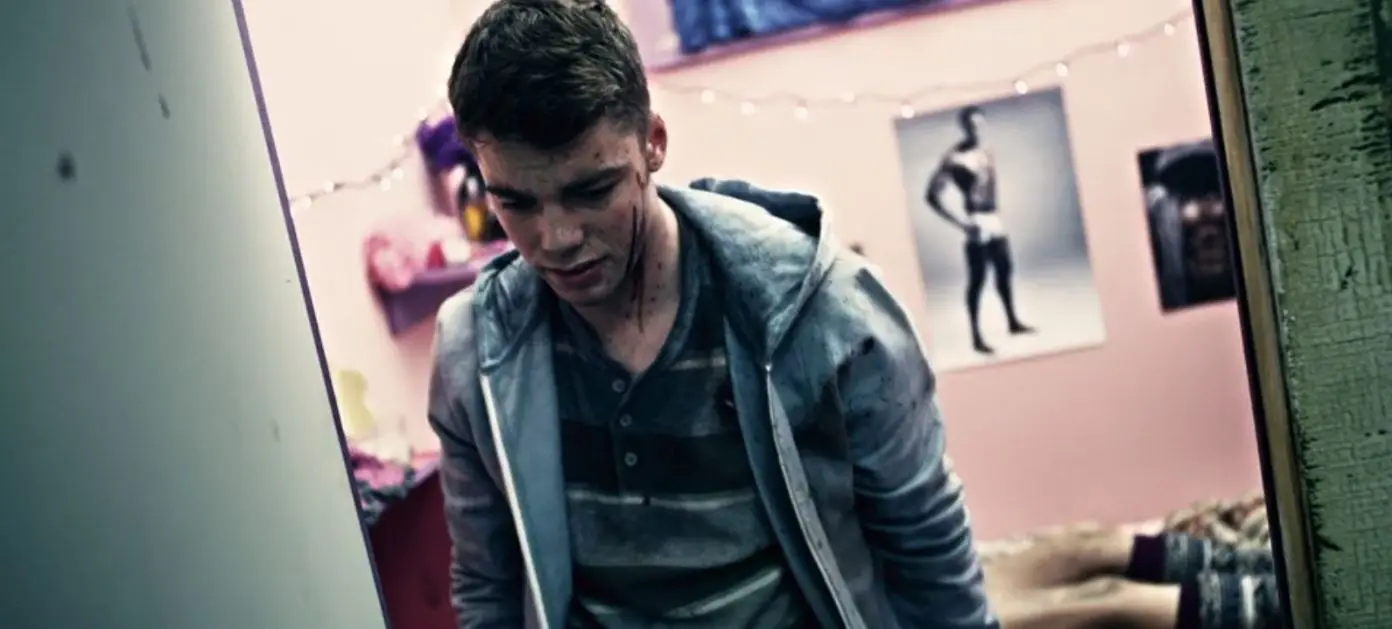
If the disease of The Hive is that it can’t see its own potential, its tone is how it manifests. There’s a sassy nurse (Sonya Eddy) who needed to be in the movie much more if she was going to be in it at all. The fact that we never see her as part of the Hive after verbally wrestling with her earlier is just the sign of someone who doesn’t know how to pay things off: Edgar Wright would have paid off her sass with a laborious chase and a pseudo-comedic death. In this movie’s most troubling scenes – Adam has to confront the zombie version of someone in the nurse’s bedroom – a pornographic picture of a smiling bodybuilder keeps popping up in the frame. I could not keep my eyes from it and I also could not tell if it was intentionally funny. The same goes for the dialogue. Everything that comes out of Clark’s (Jacob Zachar) whiny mouth is bad movie talk, reject lines from Friday the 13th sequels. There’s nothing especially wrong with that; lines like that pop up in James Gunn’s Slither too, which has more of that ironic bounciness that The Hive seems to want at the most awkward times. What’s wrong is that Yarovesky isn’t ready to give in to it.
He wants Danny Boyle-esque visuals as though The Hive is outgrowing its inspirations: Cinematographer Michael Dallatorre films Adam’s battles with his own mind with the camera emphatically tilted, with the bloom up so high that he thinks the movie is important enough to squint at. But then the conversations are underworked to the point of being poetic irony against the director’s passion more than against the genre: it’s the kind of movie that makes you feel above it because you’re not sure if it’s badly trying to be a satire or if it’s just bad. “Give her the broom,” Adam says of the zombie tied to the chair, “She likes that broom.” He’s an action hero all of a sudden, quipping about beating his friend as though it doesn’t affect him that he just discovered that zombies exist. A lot of this movie is filmed handheld and it hopes it will translate to richness. But you can’t just wish for something like that. In order for dutch angles to work, you sometimes have to film a scene without one.
Is there anything left after these characters’ reality-challenging levels of stupidity wreak havoc on all their lives? The answer is, surprisingly, yes: there’s something left, which The Hive seems to care about, in that way that a teenager cares for their crush. It finds its way to a sweet moment and it feels a little earned because even in all this stupid horror movie stuff, the film boils down to something as simple as how a guy feels for a girl, and what that means about how he thinks of himself. The movie admirably goes after that with a little passion. It just fails so hard at being scary that it didn’t actually need the zombies.

